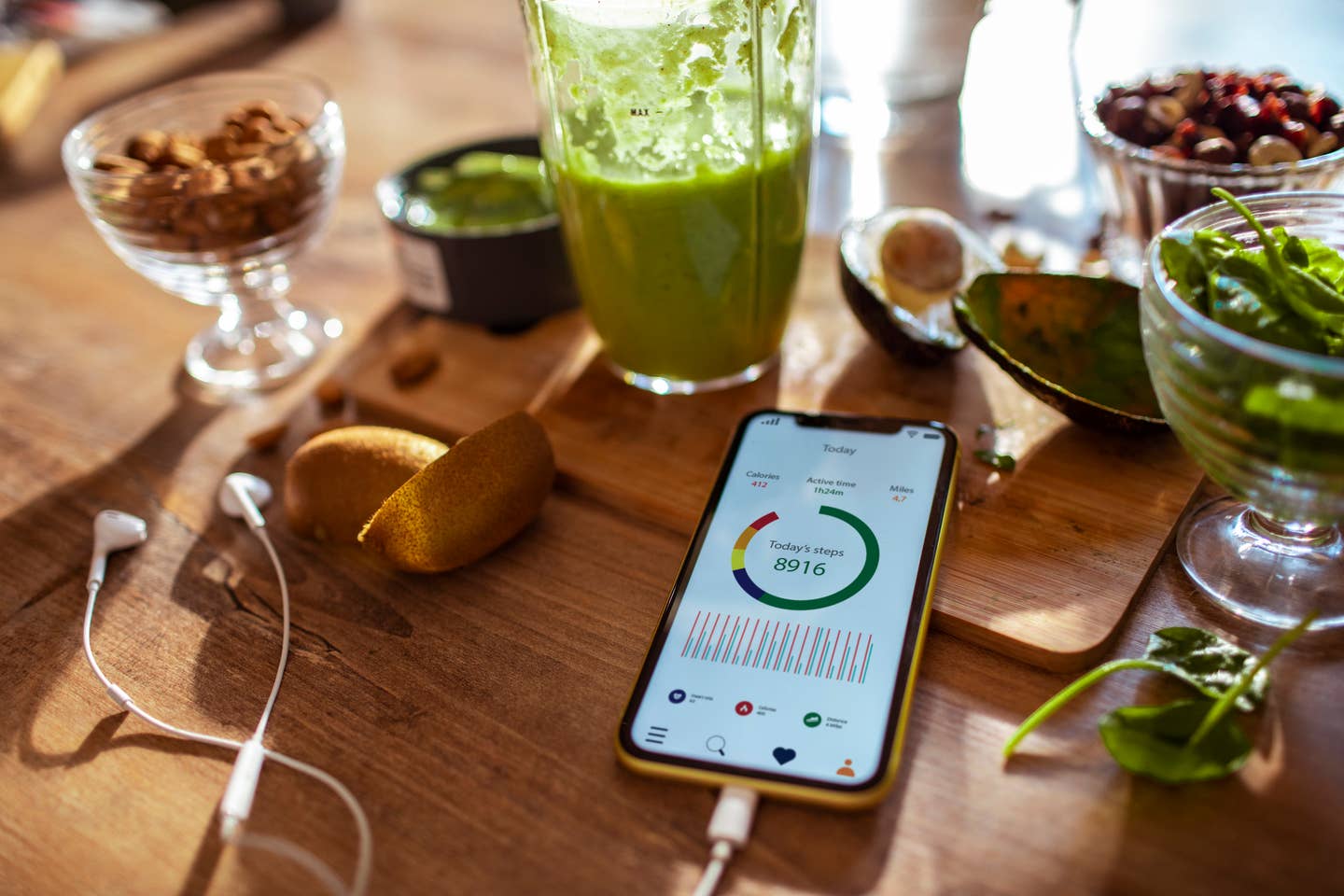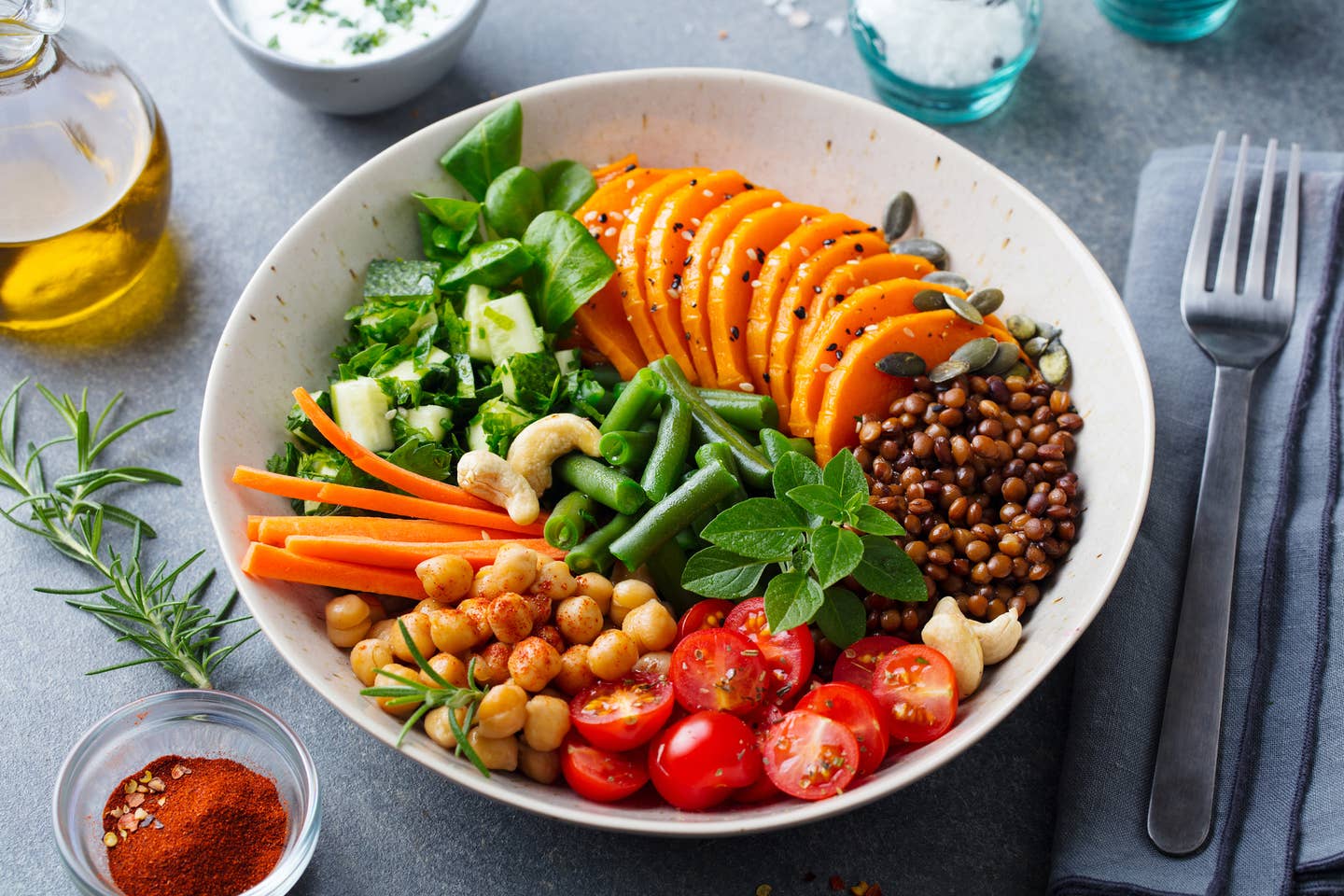
Mediterranean Diet Is Best for Lasting Weight Loss. How to Make it Vegan
The Mediterranean diet has long been ranked as the healthiest way to eat among diet and nutrition experts since studies show it helps reduce the risk of lifestyle diseases like heart disease and obesity. But now new research shows that it is also the top method for long-term weight loss, beating low-carb diets and other fads for the most effective way to lose weight and keep it off. Even healthier than the Mediterranean diet is the so-called "Greener" Mediterranean diet, which replaces animal protein and fish with plant-based protein sources such as legumes, whole grains, and nuts and seeds.
In a Cambridge study on people who lost weight and kept it off, those who adhered to a Mediterranean diet high in protein were twice as likely to keep off the weight once they had lost it. "Higher adherence to the Mediterranean diet was associated with 2-fold increased likelihood of weight loss maintenance," the study found."Future studies should replicate these findings in non-Mediterranean populations as well."
What is the Mediterranean diet?
First things first: A brief overview of the Mediterranean diet, which gained popularity in the 1990s (despite being a way of life for many decades before that). “The Mediterranean diet is based on the traditional foods and cooking methods used in countries that border the Mediterranean, including Italy, Greece, France, and Spain. It focuses on vegetables, fruits, whole grains, nuts, seeds, beans, herbs and spices – and heart-healthy fats, particularly olive oil – that are grown locally and eaten seasonally,” explain Lyssie Lakatos, RD, and Tammy Lakatos Shames, RD, aka The Nutrition Twins. Fish and seafood are staples of the traditional diet, as well as dairy foods in lesser amounts.
The Mediterranean diet puts an emphasis on savoring your meals with good company, and being physically active through the day, they add. "Foods that aren’t as wholesome and nourishing, like refined grains, added sugar, and processed foods, are not consumed” as part of the Mediterranean diet, they add. “Research has shown that following a Mediterranean diet can help with weight loss, promote brain function and cardiovascular health, helping to prevent heart attacks, strokes, type 2 diabetes, Alzheimer’s disease, Parkinson’s, and more.”
With its emphasis on fruits, veggies, beans, whole grains, olive oil, and nuts and seeds, it’s easy to adapt this "Greener Mediterranean diet" to become a fully vegan Mediterranean diet, whether you’re looking to do so for the environment, animal welfare, or health reasons — or all three. A plant-based Mediterranean diet for weight loss is also a popular choice for many, since filling fiber from lots of fresh produce and satiating protein from beans and nuts, make it easy to drop weight.
How to follow a vegan Mediterranean diet
“The Mediterranean diet is quite easy to follow if you’re fully plant-based since it emphasizes mainly plant-based foods,” reiterate The Nutrition Twins. “The secret to getting adequate protein is to focus on replacing animal proteins, like fish, seafood, meat, and eggs with plant proteins like beans, tofu, nuts, and/or seeds, at each meal. You’ll get a boost of protein without adding cholesterol or saturated fat, as animal protein would,” they say, adding that you should ensure you also include sources of omega-3 fatty acids, like nuts and seeds, including hemp seeds, chia seeds, walnuts, and flaxseeds since you won’t be meeting your needs through fish or seafood. Include plenty of leafy greens, as well as tahini and sesame seeds for calcium.
To make the shift easier, The Nutrition Twins share this rule of thumb: “For any meal that includes animal protein, think about which plant-based replacements you’d like—black beans, chickpeas, hummus, lentils, or tofu – and swap that for the animal protein. For example, if you normally would have salmon, quinoa, and sauteed greens at dinner, replace the salmon with tofu. Simply toss beans, lentils, or tofu in salads, burritos, pasta, soups, or in veggie stir-fries, like this simple one.
Make a veggie and tofu scramble, just like you’d make eggs, or create a creamy protein-packed smoothie by adding tofu or chickpeas instead of yogurt, they say. “Add nuts and seeds (hemp, chia, walnuts, and flaxseeds) to salads, to cooked grains like quinoa and oatmeal for a great crunch. Also add them to overnight oats, smoothie bowls, and stir-fries — or have a handful of nuts as a snack. Use tahini and hummus as veggie dips, sandwich spreads, or sauces. Top sweet potatoes with beans and tahini.” The list goes on and on, with the delicious possibilities virtually endless.
As with any major nutrition changes, be sure to consult with your doctor or trusted healthcare professional before overhauling your diet. On a plant-based Mediterranean diet, ensuring you’re getting enough vitamin D and B12 is particularly important.
The plant-based Mediterranean diet for weight loss
Following a vegan Mediterranean diet is a great plan to promote healthy, lasting weight loss, experts say. “A plant-based Mediterranean diet leads to weight loss due to significantly reduced calorie intake, decreased consumption of saturated fats, reduced intake of processed sugars and foods high in calories, and increased fiber intake,” offers Mitchelle Wright, RDN, a registered dietitian and nutritionist from New York and the founder and editor at Kitchenvile.com.
Eating according to the Greener Mediterranean diet can be great for weight loss because it emphasizes nutrient-rich, satisfying foods like fruits, vegetables, beans, nuts, seeds, and whole grains that fill you up with fiber, while the diet also contains minimal amounts of calorie-dense foods that most people tend to overeat, like refined grains, chips, and snack foods, and sugary foods. “It also encourages physical activity, which helps to create a calorie deficit that is necessary for weight loss. Just watch portion sizes to ensure weight loss,” they add.
To supercharge your weight loss efforts on a vegan Mediterranean diet, Wright shares that it is important to note that portion control is an essential element when losing weight while on a Mediterranean diet. “To lose weight effectively, portion control, the timespan between meals, and methods of preparation factor in [to things],” she says.
The Nutrition Twins further comment that their “sure-fire secret” to help make the diet work for weight loss is always to fill half of your plate with vegetables and not add too much if any, high-calorie sauces and dressings (instead they recommend just mixing veggies into the rest of your meal, and they will take on those sauces and flavors). “[Vegetables] fill you with their fiber, and they’re very low in calories, so you won’t be as likely to overeat large portions of other foods.”
Bottom Line: Try the Greener Mediterranean Diet for Lasting Weight Loss
As you embrace this way of eating, realize it may take some time to adjust to your new diet, but considering it boosts your health in so many ways from protecting your brain health to supporting your cardiovascular health, it’s well worth it.
For more expert advice, check out The Beet's Diet & Weightloss articles.
More From The Beet






